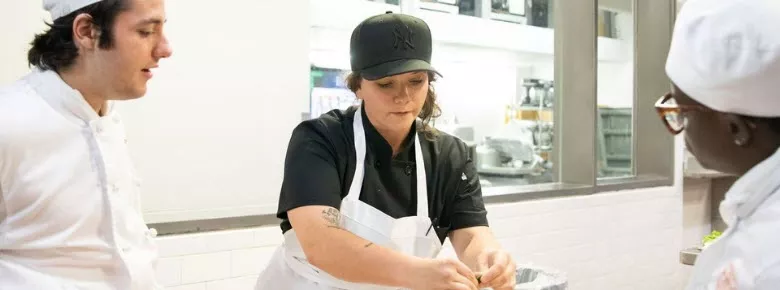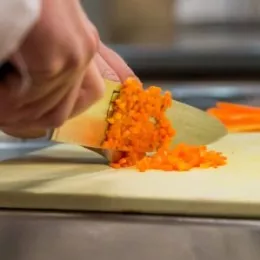Just this year, Chef Sarah Welch’s restaurant, Marrow, was nominated for a James Beard Award and named one of Eater’s 16 Best New Restaurants in America. Her restaurant, where she is the Executive Chef and Partner, is arguably one of the hottest restaurants of 2019—not just in Detroit, but in America. So, who is the 2010 graduate of our Professional Culinary Arts program?
 She was raised between Jamaica and Michigan in a family that surrounded themselves with culture, cooking, and eating. After earning a degree from MSU in Restaurant Management, Sarah left Michigan to pursue her culinary studies at ICC, where she graduated at the top of her class. While most of her training comes from notable Michigan chef Brian Polcyn, she grew a loyal following during her tenure as Executive Chef of Republic Tavern, an extremely seasonal, award-winning, nose-to-tail restaurant in Detroit. Today, Sarah is the Executive Chef and Partner at restaurant-butcher shop hybrid Marrow, where she explores seasonal ingredients through a world lens.
She was raised between Jamaica and Michigan in a family that surrounded themselves with culture, cooking, and eating. After earning a degree from MSU in Restaurant Management, Sarah left Michigan to pursue her culinary studies at ICC, where she graduated at the top of her class. While most of her training comes from notable Michigan chef Brian Polcyn, she grew a loyal following during her tenure as Executive Chef of Republic Tavern, an extremely seasonal, award-winning, nose-to-tail restaurant in Detroit. Today, Sarah is the Executive Chef and Partner at restaurant-butcher shop hybrid Marrow, where she explores seasonal ingredients through a world lens.
Marrow is a farm-focused restaurant and whole animal butcher shop, working with local farms and purveyors that embrace sustainable, humane, and ethical practices. With the desire to be known as the neighborhood spot where customers feel at home, their mission is to “…connect local producers to local communities with a focus on constant evolution through education.”
To contribute to the Detroit community, they support local charities, mentor culinary students, and work with local businesses to better connect people to the food they eat. We sat down with Sarah to discuss life after culinary school, why the nose-to-tail movement is so important, and how supporting local can give back to a community. Check out our interview below!
Where were you born & raised? Was cooking and food something you were exposed to at a young age?
I grew up splitting my time between Ann Arbor, where my family lived, and Boughton, Jamaica in the West Indies where my father was building a resort. We grew up with Jamaican children who, unlike the American children we were friends with, could cook for themselves as early as 8. I was fascinated with their ability to grill fish over open fires or make dumplings from just flour and water. Those are certainly foundational memories for me, but my family, as a whole, is very food focused. Eating Foie Gras for Christmas wasn’t unusual, so I’m sure that played a part in my interest in food too.
Why did you choose to go to ICC? Was there a reason that you decided to attend culinary school first instead of jumping into the restaurant industry?
I had always wanted to go to culinary school, but my father insisted that I go to business school first. He figured I’d have a change of heart because he knew that it was a hard career that doesn’t always pay well. But, I’m stubborn, so after graduating from Michigan State University with my business degree I made good on my word and enrolled in culinary school.
I chose to go to culinary school, instead of going straight into the industry, because I knew that there was a lot that I didn’t know. I didn’t want to be operating at a disadvantage. I knew culinary school wouldn’t provide me with everything that I needed to know, but that it would give me a foundation of knowledge and a greater chance at success when I did join the work force.
I chose ICC because I only needed hands on knowledge—not a four year degree. While working in Lansing, Michigan area kitchens before choosing a school, I had asked around about reputable places to go. One of my chefs at the time insisted I check out ICC. I went on a tour and immediately felt like the type of education that ICC was providing, with intense hands-on training and real life experience cooking classic food, was the kind of education I was looking for. Also, I really liked that there was a work requirement to the education. My externship at the Spotted Pig was hugely influential to my career trajectory. Not to mention, the school has an incredible network of alumni and chefs, and I knew that was a huge part of the industry and your success in it.
Do you still use any knowledge that you learned at ICC in your day-to-day?
I don’t often find myself relating the skills I have to what I learned in school versus what I learned in kitchens after school, but I know that the knowledge I gained in school allowed me the experiences in my career. There are certainly techniques, finer points of cooking, which I have that those without a culinary education do not have—I’m also aware that they have a working knowledge of the industry that I do not yet have. Regardless, I am certain I use the knowledge I gained in many ways.
What made you interested in the nose-to-tail movement?
My externship at ICC led me to staging at The Spotted Pig which opened my eyes to offal cookery. I decided to leave NYC to work for Brian Polcyn, the co-author of Charcuterie: The Craft of Salting, Smoking, and Curing and Salumi: The Craft of Italian Dry Curing. Working for him, I learned how to fabricate and manipulate most animals. I also learned the importance of full utilization and its impact on not just the planet, but the bottom line of a business. Its been a cornerstone of my cooking, both from an ethical and a pragmatic stance, ever since.
Why is exploring local ingredients and educating your customers about their food so important to you?
I think people are far too removed from the food chain. I feel responsible for ensuring that people who dine with us understand where their food comes from and what it took to get the food to them so that they understand the pricing. By educating people about the food they eat, they are more empowered to make better food choices. An educated customer base, one that understands the implications behind the food that they eat, has the capacity to drastically improve the food network as a whole. And so we work slowly to bring food consumption and cultivation back to a local economy— to wean off commodity food purchasing and return to seasonal, local eating. We know food that spends less time traveling isn’t just better tasting, but that it’s less harmful to the planet.
This blog post was originally published by the International Culinary Center (ICC), founded as The French Culinary Institute (FCI). In 2020, ICE and ICC came together on one strong and dynamic national platform at ICE's campuses in New York City and Los Angeles. Explore your culinary education where the legacy lives on.



